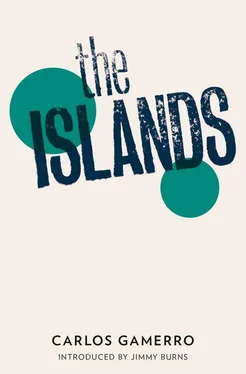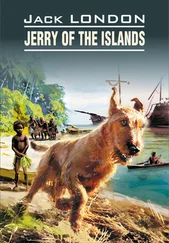‘You? Here?’
‘Here where?’
Good question, I thought, looking to the horizon for the answer. The lights of Puerto Argentino curved far beyond the two ends of the bay, their remote brightness lighting up the sky. How it had grown since the last time. I had the vague sensation of having dreamed as I slept, dreamed, like so many other times, of going home; only this time it had been the longest dream of all: a full ten years of illusory return condensed into a few minutes’ doze.
‘They’re all dead,’ I said to him.
‘Just the old man. They’ve already taken him away. Let’s get out of here before they come back.’
‘Where to?’
‘Home.’
The silhouette of the containers could be made out in the distance. We must be at the airport, I reassured myself, but instead of the planes an incredible apparition met my eyes, its prow rising triumphant from the mists of sleep: the phantasmal hulk of a Spanish galleon, still intact, as if it had just run aground in the cement. A second later I knew where I was.
Through the rusted corrugated iron they’d opened up a hole that you could put your head through, and in the heart of the container full of compressed paper there was a hollowed-out den with just enough room to curl up and sleep. A tunnel communicated with the other container, where they kept their belongings, he explained; the thick paper walls provided insulation from the cold outside, so much so that I was warm again in minutes. I had a dreadful taste of wet ash in my mouth, a perishing thirst and a real headache that was my own, getting stronger as the one induced by the drug waned. The tramp’s rear end disappeared down the tunnel that led to the other container and his head returned, preceded by a tall string of stale bread rolls and a large, litre-and-a-half bottle of water.
‘You can’t ask for more,’ my host summarised as I downed almost half the bottle without drawing breath and immediately set about the fossilised rolls with my molars. ‘But I can’t enjoy it any more. He, on the other hand, was never happy. When it was fine out, he’d spend it on the terrace, watching them. You don’t know how lovely we had the terrace done out. Even had a couple of loungers. Got any cigarettes? I’m dying for a smoke.’
The lighter flame lit up the white walls of the room. It looked like a tattered igloo.
‘He never explained why. On a couple of occasions I suggested going away, jumping on a train, seeing the country; but there was nothing to be done. I threatened to go off by myself, and he just said, “Well, go on then.” I always ended up staying. I couldn’t imagine spending a night alone. What are those furry mice called, the ones that go round and round on their little wheel till they get tired and snuggle up together to sleep in the middle of a nest of paper?’
‘Hamsters.’
‘That’s what we were. Two hamsters that had got tired of the wheel.’
‘What happened?’
‘They approached him one day when he was out there, working on his toy tower. It was what he enjoyed most, working on his tower, and I used to help him. But he abandoned it on the grass, in the supermarket trolley, and followed them without saying goodbye. I saw them walk through the mirrors and disappear. Hours went by, then days, and I began to push it around its elder sister in the hope that he’d see it from some window, and come out and give me something — food, clothes, a few coins, or at least talk to me. But I never saw him again. Till that night, of course.’
‘Which night?’ I asked him, just for the sake of helping him in the telling, the answer being obvious.
‘The night they threw him out.’
He spat between his feet and put out his fag end, which sputtered in the gob of spittle, to prevent all that paper catching fire. I took another drag and did the same.
‘Luckily they didn’t take him far,’ he added.
‘Do you know where he is?’
Instead of answering he pushed past me, digging his way through the papers, which kept collapsing, to reach the exit. I followed him. Opposite us, duplicated in the reflection of the still waters of the dock, the sails of Columbus’s caravel blacked out the stars, its voluminous pregnant belly solidly embedded in the cement pedestal the tramp was staring at.
‘His dream came true, in the end.’
‘Which one?’
He looked at me steadily.
‘He was there as well.’
The finality in his tone of voice was unmistakable. For me, of course.
‘He always used to say it was in the Islands he became a tramp. And when he got back, it seemed only natural to stay one. He’d come to the port in the hope of finding a ship to take him back. I was ready to go with him. Every now and then we’d do the rounds and ask. The sailors laughed in our faces, though some felt sorry for us sometimes and would take the trouble to explain. The ships that go to Malvinas don’t leave from here, they’d tell us. But he never lost hope. And now you see. Finally he found it.’
He pointed at the caravel that had caught the wind of departure in its unfurled sails, straining to tear its hull free of the cement vice. The stars shone through the holes in its ribs.
‘It’s ready to sail.’
So this was the boat that would take us back to the Islands: a ghost ship, of course. Would I still be in time to board it?
‘You can stay if you like,’ he said without much hope.
I remembered the Borda.
‘I’ve tried it. It’s not my thing.’
He gave a shrug.
‘You’re welcome whenever you like. Bring a packet of yerba next time and we’ll have some matés.’
I was turning away when I remembered.
‘Hey!’
‘What.’
‘Thanks for the help.’
His double row of peg teeth grinned back.
‘Don’t forget the yerba,’ he said.
* * *
I didn’t have a single coin for the bus in all the pockets I checked, and I couldn’t remember if there was any money at home to risk taking a taxi. It wasn’t that far after all and, despite how weak I felt, it didn’t seem impossible to walk home. My silent steps led me round the edge of the dock to Avenida Belgrano, which led me out of the port and across Avenida Puerto Madero, empty of lorries at that hour, and reached Avenida Paseo Colón, where the traffic lights blinked their colours pointlessly at the absent cars. Only a couple of taxis went past, stalking the only pedestrian in the sleeping city, more out of resignation than hope. Walking in socks down the empty downtown streets at the deadest point of the week, the interregnum between the long night of a winter Sunday and the reluctant morn of Monday, was no different than in dreams. And it wasn’t even my own dream. Only when I reach home, I thought, will I be in a place where the nightmares of the living and the dead can’t reach me; I’ll turn the keys and pull down the blinds, turn on all the screens and never come out again unless it’s through them, leave them all in the street knocking on the doors I’ll never open. That had been my first mistake, which all the subsequent ones derived from as a logical consequence: going outside. None of this could have happened to me on the Web.
The pain had gone almost completely. The drug in the end hadn’t been any more than that: a little bit like seasickness which, once it’s passed, leaves no trace and it’s hard to believe it could ever have been so bad, the relief of treading on land again so pleasurable that you even look back with a little nostalgia.
Was this how it was ten years ago? Was this what I’d been spared: this silent, floating moon-walk my companions’ tales had allowed me to remember as if I’d been walking with them? Had they plodded on as I did now, drawn towards the plain by the inertia of defeat, descending the mountains towards the doomed capital like a flood, pouring through its streets minute by minute in an unstoppable olive green torrent, knocking down fences, trampling on vegetable patches, lapping against the walls of houses at whose windows the terrified Kelpers dared not show themselves; spreading little by little, milling around till they settled like the waters of a lake, depositing a flotsam of abandoned weapons, ammunition boxes, empty helmets, rucksacks, kicked bags — all useless now that the only thing left to do was to sit down in silent bunches and wait for the English to come? I have to get there before they do, I said to spur myself on down the deserted slope of Avenida San Juan, my steps so silent that not even I seemed to be there; I have to hurry, I repeat to myself, even if I know that I’m ten years too late, that the Kelpers and the English are sleeping safely in their beds and I’m the last Argentinian in the Islands.
Читать дальше











